
Awe-inspiring secret moves
The human body really is amazing in so many ways. It can jump and run, dance and spin—and that’s just what you can see. So many of the body’s awe-inspiring moves happen behind the scenes, without assistance or even our knowledge. No matter how hard you try, these are the bodily functions that you just can’t control.
Get The Healthy @Reader’s Digest newsletter

Your muscles are constantly ripping
This sounds like it hurts, and in some cases it does—the constant tearing of muscle tissue may be why you feel a bit sore after a workout. But, it’s also the key to developing more muscle strength. “Placing stress on muscle tissue, such as when weight training, causes tiny, microscopic tears in the muscle fibers, which are actually needed for muscle growth,” says Erin Palinski-Wade, a registered dietitian and author of 2 Day Diabetes Diet. “When at rest, the body works to repair and rebuild these torn fibers by fusing muscle fibers together to form myofibrils, or new muscle protein strands, that then increase in number and thickness to create growth of the muscle itself.” Still, you should listen to your body and not overdo it while exercising to prevent injury.
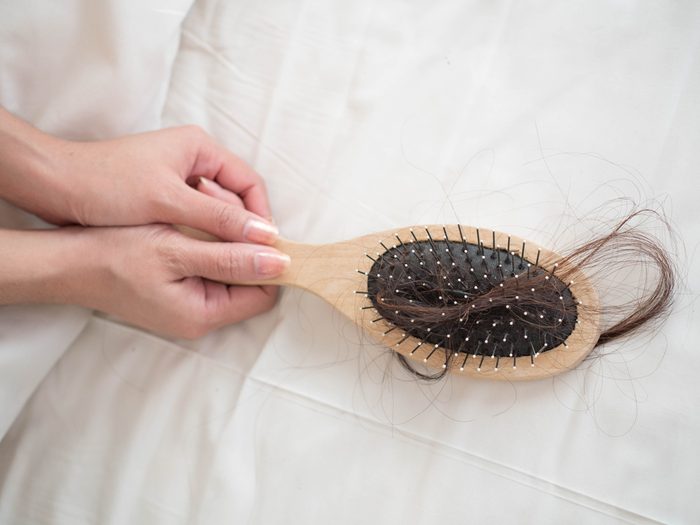
Your hair is falling out
If you have long hair, you might worry when you see so much of it clogging up your shower drain—but it’s totally natural for us to shed. “Most of us lose up to 100 hairs from our scalp every day, which is normal,” says family physician Jennifer Caudle, DO, an assistant professor at Rowan University School of Osteopathic Medicine. But according to the American Academy of Dermatology, excessive hair shedding, which may happen because of physical or emotional stress, is different from hair loss, in which the hair actually stops growing. “About 80 million men and women in the United States have hereditary hair loss,” Dr. Caudle says. “But, it’s possible to lose hair if you have certain medical conditions or take certain medicines.” If you think you have excessive hair loss, see your doctor.
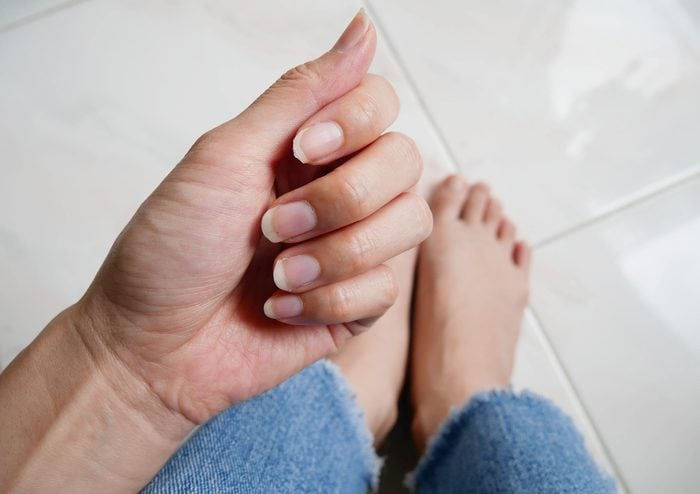
Your fingernails are relentless
Your nails help protect the tissues of your fingers and toes. They grow faster the more you use them—and they grow faster on your dominant hand. “Fingernails grow about one-tenth of an inch, or 2.5 millimeters, each month, and it can take about three to six months to completely replace a nail,” says Dr. Caudle. Another weird fact: fingernails grow faster during the day and in the summer, leading some researchers to believe the rate of nail growth is also linked with better circulation.

You’re making multiple pints of gas a day
Our culture may think of gastrointestinal gas as gross and releasing it as rude, but it’s actually a normal bodily function. “Everyone has gas, and most people pass gas 13 to 21 times a day,” Dr. Caudle says. According to Johns Hopkins Medicine, most people make about one to four pints of gas a day. It has to be let out somehow!
“Gas in your stomach, released with burping, is primarily caused by swallowing air when we eat or drink,” Dr. Caudle says. “Gas forms in the large intestine when bacteria ferment undigested food from the small intestine. Bacteria consume some of that gas, but the remaining is released by passing gas from the anus.” Some foods may produce more gas than others, and acid reflux and other medical conditions can also cause increased burping. Most gas is odorless, but farts can contain sulfur that gives them an unpleasant scent.
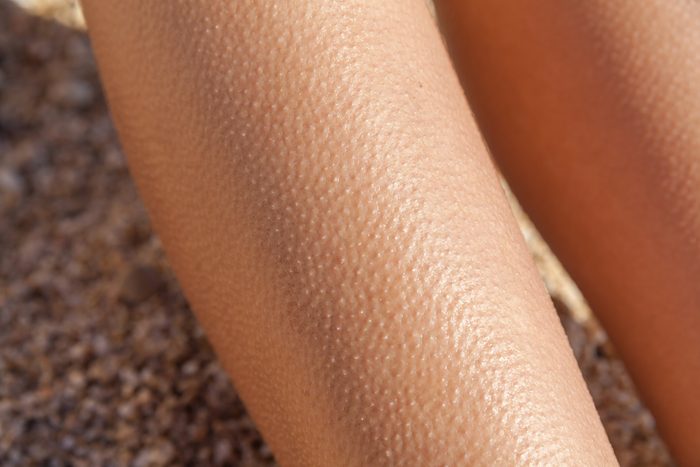
Your goosebumps think they’re being useful
Chalk this one up to evolution—if we had fur, goosebumps would serve a clear purpose. “Goosebumps happen involuntarily and are caused when a small muscle at the bottom of each hair follicle contracts, causing the hair to stand up. In animals this may actually form a layer of insulation,” Dr. Caudle says. “They can occur due to cold air or also happen when we experience strong emotions such as shock, fear, anxiety, or even being inspired.” These situations trigger a flight-or-fight response in animals, so they raise their hair to create a bigger appearance in an attempt to scare off their enemy.
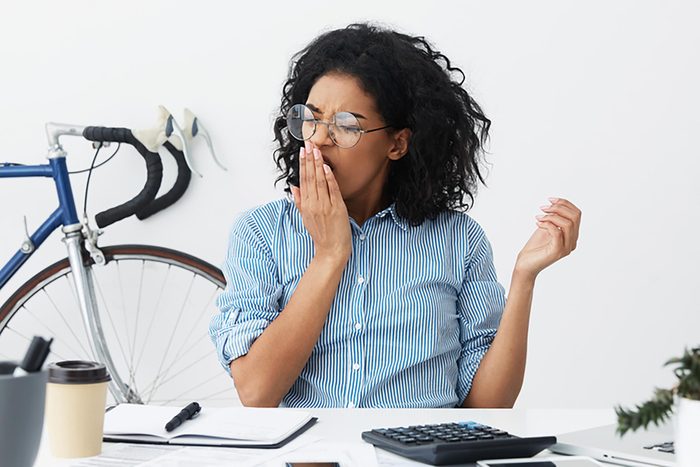
You just can’t stop yawning
Why we yawn is one of the biggest unsolved mysteries of the human body. But there are some theories. “Yawning is a natural reflex of the body that allows more oxygen to be inhaled,” says Mehwish Awan Khan, MD, family medicine physician at PIH Health in Santa Fe Springs, California. In this way, stretching out with a big yawn could be a way to wake us up. Another theory, supported by research in Physiology & Behavior, is that yawning has an effect on brain thermoregulation, and helps to cool it down. Whatever the cause, one study in Evolutionary Psychology suggests you can try nasal breathing to stop yawns from continually happening.
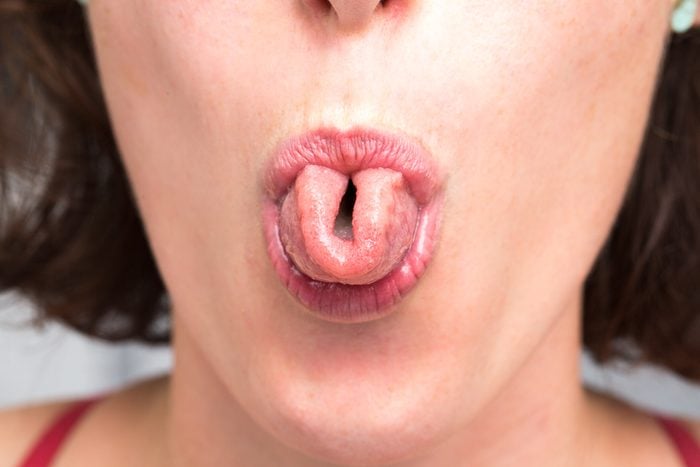
Saliva is constantly flowing into your mouth
Anyone who’s ever gotten a wet willy knows saliva can be downright disgusting. But it’s crucial for oral health and digestion. “The purpose of saliva is to moisten food to make it easier to swallow,” Dr. Khan says. In addition, saliva “assists with taste and improves mouth hygiene by preventing mouth infections and tooth decay,” Dr. Caudle says.
But what exactly is saliva? “It mostly consists of water, but has other chemicals and enzymes as well,” Dr. Caudle says. “Saliva is produced by the salivary glands, which secrete about two to four pints, or about one to two liters, of saliva every day.” Having loads of spit is actually preferable to a dry mouth, which can lead to bad breath and bacterial infection.

Sebum is layering itself all over your face
Although too much oil can be a bad thing, you need some of the bodily fluid called sebum to keep your skin moisturized and healthy. “We are a nation obsessed with that ‘squeaky clean feeling’ and antibacterial soap,” says Whitney Bowe, MD, a board-certified dermatologist and author of The Beauty of Dirty Skin. “If your skin feels stripped or squeaky clean after you cleanse, you are harming your skin’s healthy barrier and drying it out.”
Our sebaceous glands produce the oily substance called sebum to lubricate and waterproof our skin, deliver important nutrients, and protect our skin against environmental pollutants and free radical damage, she says. “Our skin’s natural barrier is critical to our skin’s health, so use a gentle, pH-balanced cleanser when washing and refrain from scrubbing or using harsh products,” Dr. Bowe says. “If we over-cleanse and strip away too much of our skin’s healthy oils, our skin tends to over-correct and pumps out even more oil, which can contribute to breakouts and other skin issues.”
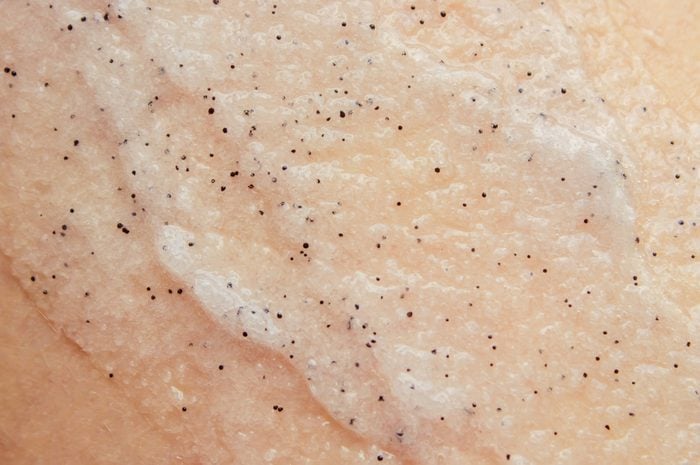
Your skin is shedding all over the place
It’s true—you’re living among piles of dead human skin cells. “Over the course of a day, we shed almost a million dead skin cells, approximately 30,000 to 40,000 every hour of any given day,” Dr. Bowe says. “Our stratum corneum [outermost layer of skin] consists of about 15 to 20 layers of dead skin cells, which shed to allow new living cells to push up from beneath them.” This organic material is a major contributor to household dust—which some people find gross to contemplate. It’s important to exfoliate dead skin gently, so it doesn’t clog pores.
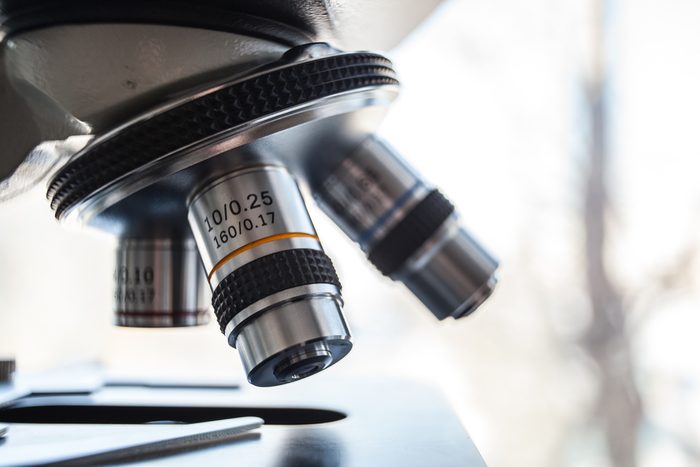
There are bugs crawling all over (and inside) you
Your body is a hotbed of activity for all sorts of microscopic creatures. But never fear: Some of these “bugs” are actually good guys. “There are more than one trillion bacteria in the skin, originating from roughly one thousand different species,” Dr. Bowe says. “Through their sheer strength in numbers, these friendly microbes can stop the advance of bad bugs, preventing an invasion and staving off skin infections.” When in balance, our skin’s “microbiome” is actually the key to a healthy complexion—and these good bugs work inside the body, too. “We want to try to get more probiotics into our diets, to help nourish the good bugs in our guts,” Dr. Bowe says.

You have really weird thoughts
Have you ever imagined shouting out in church, swerving your car or pushing someone in front of a train? No judgement: you’re not alone. “Intrusive thoughts are unwanted thoughts or images that seem to pop into our minds against our wishes, and often focus on the thing that would be most inappropriate in a setting or the thing that we most fear,” says Hannah Reese, PhD, an assistant professor of psychology at Bowdoin College. “For this reason, they are usually upsetting or distressing to the person having the thought.”
The problem is not actually having the thought, but that as soon as we try not to think about it, our mind starts monitoring whether or not we are thinking about it, which actually makes the thoughts happen more frequently, she says. “So, when we experience an intrusive thought, it is best to recognize it for what it is, not take it seriously, and let it fade away on its own,” Dr. Reese says. If you find yourself unable to do this, you could consider seeing a psychologist.
14 Therapist-Approved Tips for Finding a Therapist You Can Trust
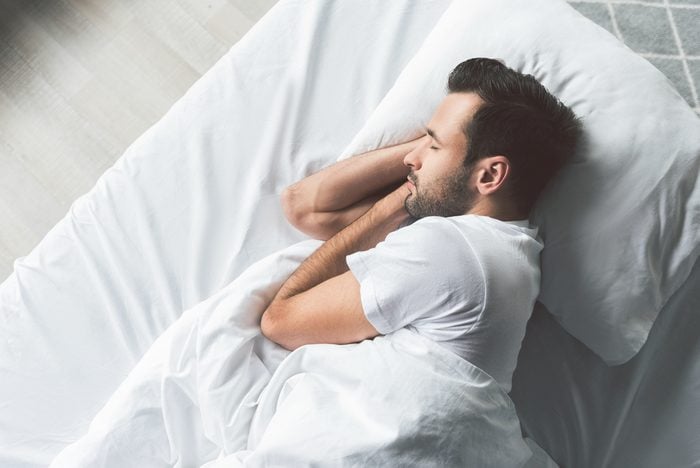
Your dreams push boundaries
Speaking of weird images, no doubt you’ve experienced a bizarre dream or two. Scientists still haven’t been able to explain the purpose of these strange reveries, but there are many theories. Here’s one theory that sleep expert Richard Shane, PhD, subscribes to: “Dreams are an expanded state of consciousness, beyond the limits of our usual linear thinking, so they can help loosen the constriction and excess control in thoughts, emotions, and body that builds up during the day,” he says. “That is a source of rejuvenation and the restful quality we get from sleep.”
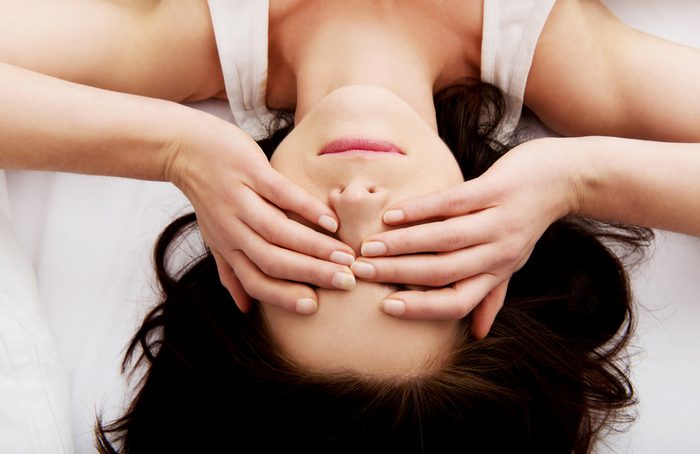
You suddenly jerk awake
You know the feeling: You’re about to fall asleep when suddenly your whole body twitches. This “hypnic jerk” or “sleep start” might even be accompanied by a feeling of falling. According to the National Sleep Foundation, up to 70% of people sometimes have them. They’re nothing to worry about—although scientists don’t know exactly why they happen. Hypnic jerks are likely caused by a natural down-regulation of your body that may be misinterpreted by the brain as a reason for concern. “We often hold tension in our muscles from stress during the day,” Dr. Shane says. “When we begin to relax on the way to sleep, sometimes that tension releases as a jerk.”
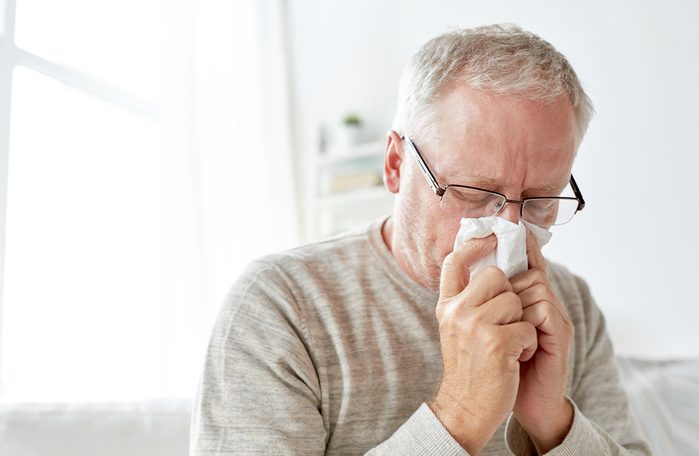
You are constantly swallowing snot
It’s hardly pleasant to think about, but snot is always sliding down your throat. Mucus is crucial in keeping your body healthy, according to research in Current Biology. “Mucus helps protect very important passages in the body such as the nose, throat, lungs, and the digestive tract,” Dr. Khan says. “It helps keep these passages well-moistened and prevents unwanted organisms from entering.” How much of this slippery substance do we create? “Humans produce about a liter of mucus a day,” Dr. Khan says.
For more wellness updates, follow The Healthy on Facebook, Instagram, and Twitter. Keep reading:

